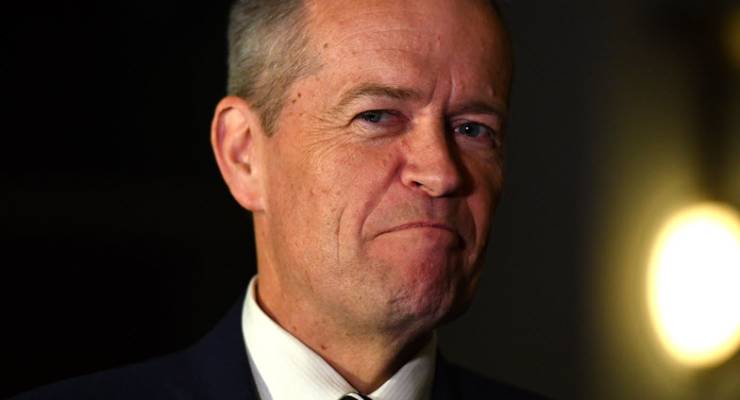
Here’s a good example of how journalists can get trapped in their own narratives.
Today The Australian is a little embarrassed by its own Newspoll, which shows virtually no change from last fortnight’s. This, according to Simon “drops king” Benson, is “despite Bill Shorten’s plan to axe tax-credit refunds for more than one million retirees”. Benson’s initial copy — changed overnight — said the result was “in apparent defiance” of Labor’s dividend imputation refundability policy. It would have been more accurate to refer to it being in defiance of his newspaper’s editorial line. The Oz has been campaigning heavily against the policy and continues today, reporting an attack on it by the IPA (there’s a shock).
Now, fair enough, some of the Oz‘s younger and more sensible specialists like the policy, but given it is only read by self-funded Sunshine Coast retirees, the editorial line is understandable.
But there’s a different problem on display — one facing every journalist who has to report on their paper’s poll. Cash-strapped newspapers devote substantial resources to polling, so the journalists reporting them are under pressure to maximise their value, even if the poll — like today’s Newspoll — tells us nothing has changed. Even changes far within the margin of error must be hyped into something significant — so the one percentage point improvement in Labor’s primary vote has to be portrayed as having actually occurred in the real world. But Labor’s vote didn’t increase; it’s statistical noise.
The other problem is that, contrary to basic rules of logic, for poll reporters, correlation must always equal causation. If some political event has happened in the last two weeks, then ipso facto it must somehow be reflected in the poll results. This is what has tripped up the Oz, because it has devoted much of the last fortnight to demonising a Labor policy, without apparent effect.
In fact, most Australians who reside on planet Earth, outside the bubble in Canberra, have likely barely heard of the detail of Labor’s policy and have no views on it either way. It will take weeks and months for any strong opinions to form and, maybe, hurt Labor in the polls (or, all those wealthy retirees who wouldn’t vote Labor to save their lives will … say they won’t vote Labor). By then, of course, other more recent events will be being blamed for any polling shifts.








Bernard, it might be a cheap shot but you could lead by example. The polls are crap, we know they are crap, you’ve discovered, at last, that they are crap so why not leave them alone altogether?
I take your point, Charlie – but somebody has to explain newspol in order to defeat the prevailing narrative that it MUST be relevant.
Don’t call these things out for what they are and next thing they are received wisdom.
Hey Bernard. I’m a self-funded retiree (without super). I live on the Sunshine Coast and I can’t stand the Australian. I even, as a born and bred Queenslander, (gasp) read the SMH!!! Wash your mouth out!!
The following two observations illustrate the perils of polling.
(1) The polls are crap, we know they are crap
(2) I live on the Sunshine Coast and I can’t stand the Australian.
To (1) why are they crap? Bernard has provided a partial answer; implied causation
from correlation and no sense of time displacement with regard to “community” opinion.
In this day and age it is very difficult to determine, statistically, what is independent
(viz independent events) and what are, in fact correlated events; particularly concerning politics.
Quite apart from respondents discharging noise (erroneous statements) into the data Polls are generally considered (or approached) as independent.
It is a good deal easier to model independent events because, otherwise, the extent of correlation has to be determined and, in the real world, such activity always attracts error; the (real) error exceeding the standard error in cases. It has been conveyed, infrequently, that Trump won because the corresponding polls assumed independence when in fact the motivations of the voters was correlated across evens x, y & z (which the polls failed to capture).
As to (2), assuming that the Australian is read, in the main, by retirees living on the Sunshine Coast (frankly I haven’t a clue either way) there is a subset to which the norm does not apply in any large sample. Clearly, the less reliable the assumption concerning a particular population the greater the percentage against the norm.
“Journalists think”, now there’s an exciting concept for the future, with the obvious exceptions to this rule, Bernard et al.
The polls are crap, because all but the most pernickety pedant recognises that polls are not actually “news”???
The polls are crap, because all but the most pernickety pedant recognises that polls are not actually “news”???
Apart from the irrelevance of polls (get an intern to spend a week with a polling company – they’ll soon learn that most, underpaid & exploited pollsters, skew their results, not (specifically) due to personal political bias but because they resent their shitty pay & (non)conditions of employment) the real question is “why IS the Oz?”.
No-one with half a brain believes a word of the RWNJ reportage/verbiage though they may entirely want to believe the world view expostulated as they have heaps of filthy lucre to protect (and, shudder, rub on their painfully erect nipples under a full moon – nods to FDotM).
Its malignant, evil siblings, the Hun, Tizer, CurryMaul & Terrograph, however are an entirely different cup of hemlock.